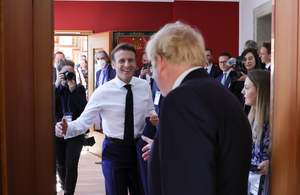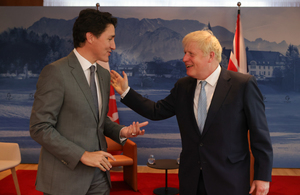UK supports new international drive to prevent and prepare for future pandemics
- UK will give £25 million to found a new World Bank fund to prevent, prepare for and respond to future devastating pandemics
- Investment in preventing future pandemics can stop the devastating human and economic impact of COVID-19 happening again
The Prime Minister has announced £25 million of UK aid backing for a new fund to ensure the world is better prepared to defeat future pandemics.
Hosted by the World Bank, the ‘Financial Intermediary Fund’ for pandemic prevention, preparedness and response will provide funding to countries whose healthcare systems are dangerously unprepared for the challenges caused by large outbreaks of infectious diseases. It will ensure they can quickly respond to, and as far as possible contain, outbreaks before they spread across the world.
The COVID-19 pandemic has led to at least 6.2 million deaths across the world and caused far-reaching economic devastation. Stopping a pandemic like this ever happening again will require a concerted and coordinated international effort.
At the G7 Summit today (Monday), leaders will discuss the importance of helping countries manage Covid as an endemic disease and the pressing need to invest in preparedness and other measures to prevent history repeating itself.
The new fund will help fill some of the financing gaps exposed by COVID-19, particularly insufficient financing for preparedness in national health systems and disease surveillance at country, regional and global levels. Crucially, the fund can help catalyse countries’ own financing, so the world is as equipped as possible whenever and wherever a new public health risk emerges.
The Prime Minister said:
“While the worst days of the coronavirus pandemic are, thankfully, behind us, we cannot be complacent. The next potential pandemic could emerge any moment and with it the devastating human and economic consequences we have experienced over the last two and a half years.
“We must ensure we learn the lessons of COVID-19 and are better prepared next time. We owe it to the people of the world to say, ‘never again’.”
The chance of a pandemic on the scale of COVID-19 occurring in the next 25 years could be as high as 50%, and a key lesson of the coronavirus pandemic is that even small investments in pandemic preparedness can have huge returns. By contributing to preparedness in the short term, we can avoid huge economic damage in the long-term.
Under the UK’s G7 Presidency last year, the Prime Minister drove forward international work on pandemic preparedness under his ‘five point plan’ and the 100 Days Mission, work on which was led by Sir Patrick Vallance. This included launching a worldwide network of zoonotic research hubs, increasing the global manufacturing capacity for treatment and vaccines, designing a new early warning system and agreeing global protocols for a future health emergency.
The UK also hosted a Global Pandemic Preparedness Summit in March, which raised over £1.2 billion to develop variant-proof coronavirus vaccines and speed up the process of developing vaccines against future health threats so this can be done in under 100 days.
David Malpass, President of the World Bank Group, said:
“I welcome the UK’s support for the new Financial Intermediary Fund to strengthen pandemic prevention, preparedness, and response functions in developing countries.
“The fund will provide a dedicated stream of additional, long-term funding to complement the work of existing institutions and operate with high standards of transparency and accountability.
“COVID-19 highlighted the urgent need for coordinated action to build stronger health systems and mobilise additional resources to prepare for the next pandemic in countries, regions, and around the world.”
At the G7 Summit last year, the UK galvanised international action to donate 870 million coronavirus vaccines to those who need them. This commitment, combined with UK and other investments to support the development and rapid manufacturing scale-up of COVID-19 vaccines, turned the tide on Covid around the world. Two-thirds of the global population have received at least one dose of the Covid vaccine.
The supply of coronavirus vaccines now outstrips demand and UK efforts are therefore focused on action to end the acute phase of the pandemic, help countries manage COVID-19 as an endemic disease and prepare for the next health threat.
Governments, NGOs and private donors have been encouraged to donate to the Financial Intermediary Fund, which was called for by G20 Finance Ministers in April.
The funding announced by the Prime Minister today will establish the UK as a founding donor to the fund, alongside the US, EU and others.

